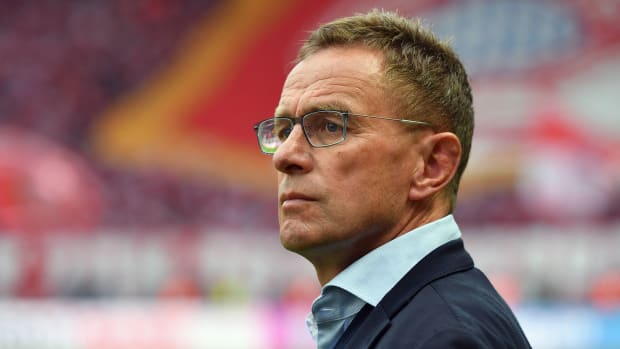The club's new interim manager is a pioneer of modern pressing and has a vision for the game that's been lacking at Old Trafford.
In February 1983, on a training field near Ostfildern in the forested south-east of Stuttgart, local sixth-tier side Viktoria Backnang played a friendly against Valeriy Lobanovskyi’s Dynamo Kiev, who were wintering at Sportschule Ruit. Dynamo won easily and was much the better side, but for Backnang’s young player-manager, the game was a revelation. Even allowing for the fact that Dynamo was a highly trained professional team, he was startled by how it always seemed to have an extra man. When the ball went out for a throw-in, he counted the players Dynamo had, just to make sure it hadn’t actually sneaked on a 12th. That was what extremely disciplined pressing could do.
On Monday, that player-manager was named as the interim manager of Manchester United through the end of the season. Ralf Rangnick is 63 now and widely regarded as one of the most influential coaches of his generation. His list of honors may be sparse—a second-flight title with Hannover, a German Cup with Schalke 04—but he was one of the pioneers of pressing in Germany, an inspiration for the school of coaches that now dominates European football.
German football was defined through the 1980s and early 90s by the idea that the game was about individual battles, physical courage and leadership. To believe that the most effective way to play was with zonal marking and pressing was to be a radical. But gradually, thanks to the likes of Wolfgang Frank and Volker Finke, and then Jürgen Klopp, those ideas took hold. Rangnick was finally accepted as a visionary, far ahead of his time.

Frank Hoermann/Sven Simon/Imago Images
His first stint at a really big club, though, with Schalke, ended badly. He did not relish the pressure of being a frontline coach and so he retreated into the background. He became a sporting rector, somebody to set the philosophy, emerging again for two brief stints at RB Leipzig, both as a short-term measure, essentially keeping the seat warm for a younger coach. His greatest success was as overall head of football development at Red Bull, coordinating the philosophy across its range of clubs around the world. Most recently, he held a similar role at Lokomotiv Moscow. In a sense, the greatest significance of his appointment at Old Trafford is less what he does as coach between now and the end of the season, and more what he is able to do as consultant in the two years after that.
“Ralf is one of the most respected coaches and innovators in European football. He was our No. 1 candidate for interim manager, reflecting the invaluable leadership and technical skills he will bring from almost four decades of experience in management and coaching," Man United director of football John Murtough said in a statement. “Everyone at the club is looking forward to working with him during the season ahead, and then for a further two years in his advisory role.”
For United, this represents a major change. Since Alex Ferguson retired, it has eschewed philosophies, preferring to find an individual who could reanimate the club. David Moyes was Ferguson’s anointed choice. Louis van Gaal evoked memories of the 90s incarnation of Total Football, but with little sense of the overhaul of the club and its academy that would probably have required. José Mourinho was a short-term fix who made things worse. Ole Gunnar Solskjaer was the ideal antidote to Mourinho, but, after successfully detoxifying the club, he never seemed close to the required level.
Each was a Messiah-figure, the leader who by some alchemy of personality and smart signings was supposed to inspire the club to glory. This, to an extent, was how Ernest Mangnall, Matt Busby and Ferguson, the three managers under whom United has won the league, had done it. But modern football is far more about processes than individuals, far more about tactical nuances than motivation. United didn’t even have a director of football until March, when Murtough was appointed.
In that sense, the appointment of Rangnick marks a radical departure, a belated attempt to build a structure that might bring consistent success rather than three isolated periods over a century. Whether his hard-pressing philosophy will work with this United squad is another issue. Cristiano Ronaldo, in particular, would seem like an awkward fit (and when he was Leipzig coach six years ago, Rangnick said he would not sign Ronaldo—albeit that Leipzig then was a very different club to United now). It was at least intriguing that Ronaldo was left out of the starting lineup to face Chelsea on Sunday.
Imposing pressing midseason is difficult, as Liverpool found after Klopp’s appointment. Expectations for Rangnick’s spell as coach shouldn’t be excessive. This is about preparing the ground for a brighter and more sophisticated future, and if the club can sneak into the top four as well, or perhaps have a run in the Champions League, for which it has reached the round of 16, then that’s a bonus.
But at least the sense of drift that has characterized the past few years is over. Man United has begun the process of becoming a modern football club.
More Soccer Coverage from Jonathan Wilson: